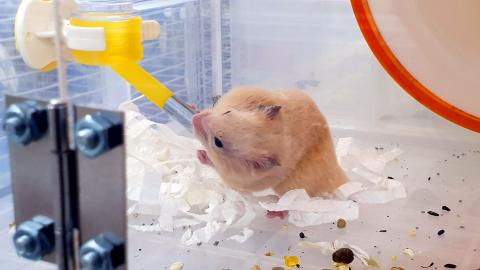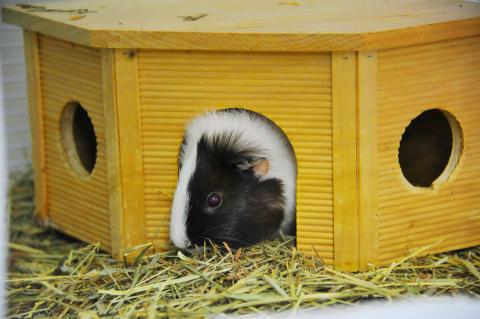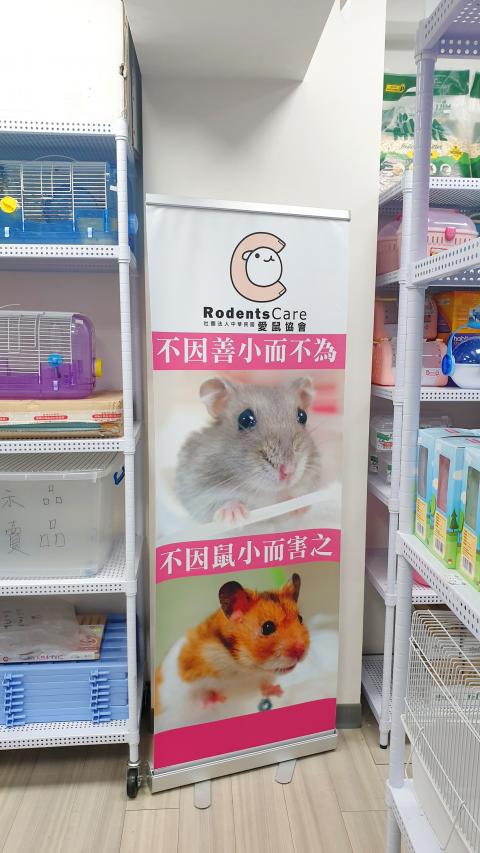Last time the Year of the Rat rolled around, many people listened to the advice of fortune tellers and bought a rodent to attract wealth. With three days left until the Lunar New Year, Rodents Care Association (中華民國愛鼠協會) president Chang Sheng-man (張勝鬘) hasn’t heard anything of the sort yet — although she is fairly certain that the animals will see a bump in popularity.
“In these cases, people aren’t buying them out of love for animals,” she says. “We are worried that we will soon be overloaded,” adding that overbreeding due to improper care is one of the main reasons people abandon these furry creatures.
Rodents — especially hamsters — continue to grow in popularity, as they’re relatively easy to care for and require little space. But Chang says pet shops often fail to warn customers of how fast they can reproduce, and the owners simply dump them when it becomes too much to handle. Rodents Care has taken in over 2,000 animals since its founding in 2016, and the rescue rate continues to grow.

Photo: Han Cheung, Taipei Times
The most important solution, Chang stresses, is to house one rodent in one cage. In addition to curbing overbreeding, rodents are usually territorial and cage-mates often end up seriously harming each other. In July of last year, the Liberty Times (Taipei Times’ sister newspaper) addressed the issue:
“People often buy several hamsters at once because they believe that it’s therapeutic to watch the cute scene of them cuddling together,” the report states. “This is totally wrong. Your imagined scenario will not happen, and the animals will end up either hurt or dead!”
FILLING THE VOID

Photo: Han Cheung, Taipei Times
Chang got her first pet hamster in college because she thought “they were cute.” Soon, she started paying attention to the issue of rodent abandonment, and decided to help out, only to find that there was no formal rescue organization. By contrast, there have been dog and cat rescues for decades and even one for rabbits, founded in 2009.
Chang says Rodents Care first started as a Facebook group around 2015. Group membership quickly swelled, and the volunteer rescuers combined their resources and started an organization and shelter.
“There were people posting information on the Facebook group about abandoned rodents every day,” Chang says. “That’s when I realized how serious the problem was, and also how many people cared and were willing to contribute.”

Photo: Han Cheung, Taipei Times
At first, there were quite a few misunderstandings as people thought the association was rescuing street rats (since the Chinese word for rodents and common rats are the same), that are considered pests. Someone even came into the shelter to scream at them, Chang recalls.
“We had to stress to the public that we are caring for pet rodents,” Chang says. “We don’t focus much on feral rats, only that people should use more humane methods to get them out of their houses.”
However, they have taken in lab rats as well as baby street rats. Adult wild rats aren’t suited to human conditions and can survive easily on the street, while a hamster cannot, Chang says. However, wild rats can make for good pets if raised from a young age.

Photo: Han Cheung, Taipei Times
YouTuber Vito (維特), for example, took in a litter of babies he found in his house last year and has been making videos with them.
“Most people in Taiwan still can’t accept it, though,” Chang says, and indeed Vito has received some negative attention for bringing them onto a television show.
ABUSE AND ABANDONMENT
Chang has seen all sorts of abandonment methods in her career. Once, someone found a box containing a winter white dwarf hamster in a bathroom stall at Taipei Main Station, with a note asking whomever found it to specifically bring the animal to Rodents Care.
The next day, the person who brought in the box inquired about adopting the hamster.
“Apparently he had never had a pet before, and spent all night reading up on hamster care. He believed that it was fate to meet the hamster, and passed the adoption review with high marks,” Chang says.
Aside from the various issues caused by overpopulation, hamsters are often nocturnal, and some people cannot stand their nightly noises, such as cage chewing or running on the wheel. Chang says another major issue is parents forcing their children to abandon the pets.
“Unlike dogs and cats, it’s easy to secretly get a pet rat,” Chang says. “Children often house the rats in their pockets and drawers. But parents think that they are dirty and smelly and spread diseases.”
It’s hard to detect animal abuse in rodents, as they are small animals and the cruelty often happens in the home. Chang says they are alerted to most cases when the perpetrator posts photos or videos of the abuse online, otherwise there’s not much available evidence to go by.
The animals are quite sensitive to heat as well. One owner brought the hamster with them to buy breakfast on a hot day, and it died on the way. Keeping cage temperature cool is crucial, Chang says.
Recently, she has been concerned about the growing popularity of the African dormouse, which are very fertile yet much harder to care for compared to hamsters. So far, they’ve only received one case — of 28 dormice — but she expects to see more.
Chang says that people often pay more attention to cats and dogs, but rats and mice also have a long history of close interaction with human beings and have been an integral part of technological advancement.
“Are they less important because they are small and their lifespans are short?” Chang asks. “If you count them in sheer numbers, they are actually quite significant. Humans should accept the responsibility of caring for them. They don’t require many resources, after all.”

Behind a car repair business on a nondescript Thai street are the cherished pets of a rising TikTok animal influencer: two lions and a 200-kilogram lion-tiger hybrid called “Big George.” Lion ownership is legal in Thailand, and Tharnuwarht Plengkemratch is an enthusiastic advocate, posting updates on his feline companions to nearly three million followers. “They’re playful and affectionate, just like dogs or cats,” he said from inside their cage complex at his home in the northern city of Chiang Mai. Thailand’s captive lion population has exploded in recent years, with nearly 500 registered in zoos, breeding farms, petting cafes and homes. Experts warn the

The unexpected collapse of the recall campaigns is being viewed through many lenses, most of them skewed and self-absorbed. The international media unsurprisingly focuses on what they perceive as the message that Taiwanese voters were sending in the failure of the mass recall, especially to China, the US and to friendly Western nations. This made some sense prior to early last month. One of the main arguments used by recall campaigners for recalling Chinese Nationalist Party (KMT) lawmakers was that they were too pro-China, and by extension not to be trusted with defending the nation. Also by extension, that argument could be

Aug. 4 to Aug. 10 When Coca-Cola finally pushed its way into Taiwan’s market in 1968, it allegedly vowed to wipe out its major domestic rival Hey Song within five years. But Hey Song, which began as a manual operation in a family cow shed in 1925, had proven its resilience, surviving numerous setbacks — including the loss of autonomy and nearly all its assets due to the Japanese colonial government’s wartime economic policy. By the 1960s, Hey Song had risen to the top of Taiwan’s beverage industry. This success was driven not only by president Chang Wen-chi’s

Last week, on the heels of the recall election that turned out so badly for Taiwan, came the news that US President Donald Trump had blocked the transit of President William Lai (賴清德) through the US on his way to Latin America. A few days later the international media reported that in June a scheduled visit by Minister of National Defense Wellington Koo (顧立雄) for high level meetings was canceled by the US after China’s President Xi Jinping (習近平) asked Trump to curb US engagement with Taiwan during a June phone call. The cancellation of Lai’s transit was a gaudy